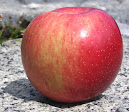Apple breeders consider consumer and production "fruit-quality traits" and even global economic strategy.
The video is produced by New Zealand's Plant & Food. Thanks to @Matthew19091976, an Adelaide-area orchardist, for bringing it to my attention.
Update: Steven Edholm has provided the perfect rejoinder to this industry video. Read his comment below, which I've also front-paged as a separate post.

Interesting. I noticed a while back how much breeding is the beginning of a line of thinking toward more and more sophisticated marketing. It seems like the trend is a little more skewed toward consumer satisfaction now. I'm not convinced that they always know what consumers will want, given a broad choice, but apple quality in stores has certainly improved tremendously since I was a kid. As many apples as it seems like they are releasing the entire industrial apple system will never be about diversity, or about really serving human needs or culture in a broader sense. It is, as the man said, a business. In that business consumers have a role, which is to be trained to buy certain things. When a new thing comes along, they will be herded toward that. In some ways this system serves us and in others it makes us weak and disconnected from our food. It certainly reduces food and cultivar diversity, always. I don't think we should accept that this is the only place our food comes from, or we will lose a lot that is very valuable. These people will never use some of the amazing parents I'm using in breeding, because they just have unsuitable traits. I think we need to keep eating, growing and yes, even breeding, a diverse array of apples in our own localized, living food cultures if we are to keep any kind of resiliency outside that system that has been set up for us to feed at, and preserve diversity, even if it's just for diversity's sake. I don't advocate narrow conservatism at all. I think many old apple varieties are not worth keeping actually, but there are a lot that are, and diversity has it's own benefits independent of that. I think we can embrace local traditions and create new ones, while still using the industrial food system in the ways that it really does serve us. I talk about some of this in my amateur apple breeding video series on youtube, for which here is a link. The whole first two videos are mostly talking about the industrial system v.s. small and non-commercial breeding. https://www.youtube.com/watch?v=SB5-4Nxej2I&list=PL60FnyEY-eJAMOPvU-yyF4JfuW5ocJvC4
ReplyDeleteWow, thanks! This is so good I have reproduced it in a separate blog post.
DeleteSteven, I really appreciate your comments here. I've watched all of your apple breeding videos, and I can't wait to see more. It's great what you're doing to demystify apple breeding and to dispel the notion that it takes a massive planting to produce any sort of decent varieties. I aspire to do something similar in the future, and your videos are a valuable resource.
DeleteYou've mentioned Albert Etter as an inspiration in the past, and I thought I'd mention a similar figure here in the Upper Midwest (albeit a grape breeder).
Elmer Swenson bred a substantial portion of the table and wine grapes grown up here today, and his varieties continue to serve as breeding material for university breeding programs. Essentially, there probably wouldn't be much in the way of decent grapes to grow around here without him. And he's another example that anyone with determination, time, a bit of land, and some (self taught) skill can be a successful breeder.